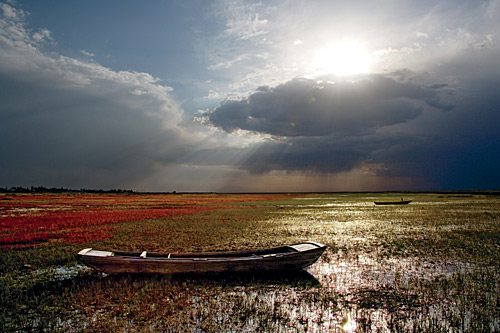|
 |
|
FLOURISHING AND INTACT: Ulansuhai Nur, the largest wetland in north China's Inner Mongolia Autonomous Region (WANG XIANG) |
For many years, 66-year-old Beijing resident Liang Yu wanted to visit the city's famous Yeyahu Lake in Yanqing County. Recently his wish came true.
Yeyahu, which means wild duck lake, is Beijing's first wetland park and only wetland reserve for birds. Its protected wetlands have grown to 10,000 hectares, accounting for more than 5 percent of the county's total area.
A wetland is a natural reservoir and considered to act like one of the Earth's kidneys. It is considered one of the three major ecological systems along with forests and oceans.
Wetlands have many special ecological functions and play an important role in preserving the environmental balance. When water flows through wetlands, substances being carried in it slowly separate out from the flow and are deposited in silt. Wetland plants take up those substances and some even absorb toxic particles.
"Wetland plants can absorb abundant amounts of nitrogen and phosphorus from polluted waters. The removal rates of total nitrogen and phosphorus can reach 70 percent and 90 percent, respectively," said Xian Ping, Director of the Department of Environmental Engineering at Guangxi University's School of Chemistry and Chemical Engineering.
Beijing's Wetlands
According to a report released by Yanqing County, the immense surface area of wetlands can effectively prevent sand and dust from entering Beijing from the northwest, and the enormous amount of aquatic plants is capable of absorbing carbon dioxide, a greenhouse gas. Yanqing's wetlands work to purify Beijing's atmosphere.
But with more media coverage of the health of wetlands over recent years, more people have been raising concerns about losing these valuable resources.
"People, including government officials, do not understand the importance of wetland preservation. They believe the most important thing is to prevent and control droughts, floods and sandstorms, but wetland preservation can be considered in the future," said Hou Baokun, former Director of the Wildlife Protection Office of the Beijing Forestry Bureau.
| 